QuestionQUESTION: I believe I asked you a question about my 2 little kittens a few days ago.
Anyhow, new question!
Like I said, I have 2 kittens, brothers, about 4~5ish months old.
First: Usually when I wake up in the morning, they will be sneezing (wet sloppy gross sneezes) and will have a little discharge in their eyes.
Are they getting chilled during the night? I have the AC on 76 (as much as it pains me because I get hot very easily.) They have a pet bed, plus they sleep with me during the night sometimes. Is there something I can do to keep them from getting chilled? Usually after a few hours after they wake up, they will stop sneezing and be pretty normal.
Secondly, why do kittens sometimes hold their tongues out of their mouths? Just the tip is sometimes sticking out of their mouths for no real reason. Just curious, it looks cute/funny.
Thanks,
Kayla
ANSWER: Kayla,
I am somewhat concerned about the fact that your kittens have discharge from their eyes and nose as this is often related to upper respiratory infections and can be potentially serious in young kittens. I would suggest that your kittens see a vet within 2-3 days to be sure that they receive appropriate supportive care and any other treatments your vet recommends. It is important to understand that cats are very different from human beings. Cats of any age have different reactions in response to stimulation from the outside world. Cats and kittens don't respond to being cold in the same way that we do, it's pretty common for a person to get a runny nose or teary eyes, this isn't a normal reaction to the cold for cats of any age. Sometimes stressers in a cat/kitten's environment can cause them to get sick, for instance, the cool recirculated air from your air conditioning unit may have contributed to an upper respiratory infection by adding some additional stress on the kitten's bodies.
In the event that your kittens haven't been vaccinated properly they may be more vulnerable to viral and bacterial infections. I would also like to take the opportunity to pass on some important information regarding vaccines in cats. Some fairly current research done by the University of Guelph (which has an incredible veterinary medicine program) suggests that kittens vaccinated properly may need fewer vaccinations throughout their lifetime. This research suggests that kidney failure which is common in middle aged and elderly cats may be related to vaccines over stimulating the immune system and causing an auto immune response that can result in kidney damage or failure. The theory is essentially that each time a cat is vaccinated (by the old recommendations once a year) their immune system reacts by creating an immune response that can potentially cause serious damage to different body systems. So far the research is still in progress but my vet began recommending that I cycle my cats' vaccines a few years ago. There is a test that your vet can perform which tests the level of immunity for illnesses that are commonly vaccinated against that is referred to as assessing blood titers. The results from blood titers should give you a general idea of how much protection your cats have from infections they have been vaccinated against. The downside to this testing is that it is very expensive, however it is also very accurate. It has been reasonably accepted that some vaccines carry a risk of tumors developing in the area they received the vaccine. Logically that would mean that fewer vaccines may help to reduce incidences of certain types of malignant growths and kidney failure. I am guessing that the researchers at the University of Guelph will attempt to see just how widespread the auto immune reactions are within cat's bodies and this research will undoubtedly help to develop better health care protocols for cats of all ages and sizes. I am also quite aware that rabies vaccines are required by law in most jurisdictions so although you have the option to cycle vaccines to help protect the ongoing and future health of your kittens the law may still require rabies vaccines. I would suggest that you ask your vet about the possibility of using vaccines that aren't administered as often and lower the health risks to your cats as well as cycling vaccines. My veterinarian has tested blood titers on animals that have received annual vaccines and been astounded at the results. Often times the levels of immunity that she has seen in blood titers is hundreds of times more than necessary to be effective, given that information it isn't inconceivable that over vaccination could be causing the immune system to begin attacking the body that it's supposed to be protecting.
If you suspect that your kittens may be finding the house too cold then you can line a cardboard box with old towels and have a heating pad under the towels on low. In order to allow the kittens to feel close to you while allowing them the option to keep warm you may want to consider placing the box on the foot of the bed or beside it. Be sure that the box is large enough to accommodate both kittens comfortably. It would be wise to use a heating pad with a built in timer that shuts the power off after a certain amount of time has passed. If you have a heating pad that doesn't have this important safety feature you could invest in an electric timer that allows the heating pad to run for a specified amount of time and then shuts off to prevent the kittens from becoming overheated as well as lowering the risk of a fire being caused by the pad overheating. Be sure that you have a fairly thick layer of towels over a heating pad if you decide to use one in order to prevent the kittens from being burned or overheating and keep it on the lowest possible temperature setting. Some cats and kittens love to sleep under blankets or curled up against their kitty parents. I know that when my oldest cat finds the house too cold for her liking she will either curl right up against my belly or sneak under the blankets to sleep. You are the best person to judge the current developmental stage your kittens are at. You could offer the kittens a chance to crawl under the blankets and spend the night there as well. I wouldn't suggest that you allow your kittens to cuddle up under the blankets if they haven't mastered keeping their claws and teeth to themselves because I can tell you from personal experience that it is rather unpleasant to turn over in your sleep and become the target of a hunting/prey killing practice. If you opt to use the cardboard bed and the heating pad set on low then it would be wise to make sure to avoid placing this box close to any vents that the A/C runs through.
As I have mentioned I am not a qualified vet but to my knowledge there are different infections that can cause cats or kittens to sneeze and have eye discharge. Wet sneezes are generally indicative of an upper respiratory infection. Your kittens may have conjunctivitis (aka pink eye) in addition to an upper respiratory infection that is viral or bacterial in nature. Vets will sometimes prescribe a course of antibiotics even in cases of viral infections simply to prevent a more serious bacterial infection from developing. I would suggest that you use clean cotton balls moistened with a bit of warm water to clean away any wet or crusty discharge from your kittens' eyes and noses to help them be more comfortable until your vet appointment. I would suggest that you wash your hands before cleaning discharge away from each kitten's eyes and nose, be sure that you wash your hands before handling the first kitten, after finishing the clean up for each kitten prior to handling the second kitten and again very thoroughly once you have finished. It is important that you know that some eye infections can be transferred from cats to people, so taking hygienic precautions is as much for your health as it is for protecting the health of both kittens. Some eye infections can be treated with over the counter antibiotic eye drops or ointments, but these should only be used after checking with your vet.
Kittens are all different, each one has their own quirks and habits. If your kittens continue sticking their tongue out once they are treated for any infections then your kittens may well have watched their mom stick her tongue out...Some kitties will stick their tongue out while coughing or sneezing, reasons vary. Cats are incredibly complex mammals. Sometimes the best way to get more detailed information about a substance like urine from another cat can be quite informative. The smell of another cat's urine often prompts a cat to stick their tongue out and open their mouths slightly. This is called the Flehmen response. This funny face is made by cats ranging in size from small domestic cats to large cats like panthers, cougars, tigers and lions. A cat's nose is several times more powerful than a person's. Essentially the Flehmen response allows a cat to obtain more detailed information from another cat's urine by sticking out their tongue and drawing the scent into their mouths over their tongue and a special gland in the roof of their mouth. The raw scent being transferred over the vomeronasal gland allows a cat to get important information about the cat that the urine belongs to. For instance the Flehmen response allows cats to smell pheromones in urine as well as providing information such as the health, age, gender and their availability to mate. This information amounts to a feline fact sheet of sorts. I hope that you have found this information helpful. If you have any further questions or concerns, or you would simply like to send an update or some pictures my way, please don't hesitate to contact me again.
---------- FOLLOW-UP ----------
QUESTION: I was worried about them having an upper respiratory infection.
They were vaccinated and are due for their next booster shots in the upcoming weeks. I will try to schedule an appointment with my vet asap and get them checked out.
They did have antibiotics, amoxcillin (sp?) the pinkish fluid in the tiny bottle, but the bottle is empty. Since I moved, I haven't visited the local vet, but I will soon.
Thank you for the info.
AnswerKayla,
Thank you for sending more information my way. I hope that you have found all of the information that I have found your way helpful.
Were these symptoms present prior to their booster shots? You mentioned that the kittens have a booster due in the next little while, I don't recommend that you allow them to be vaccinated if they are still sneezing with discharge from their noses and eyes because this will place added stress onto their immune systems which could potentially lead to them becoming far sicker or having a severe reaction to their boosters. I am guessing that the first vet your little ones to diagnosed an upper respiratory infection? It would have been best to return to the vet immediately if the symptoms didn't completely go away. Be sure to let your new vet know that your kittens were on amoxicillin, finished the duration of the treatment and still had symptoms. It is quite possible that the upper respiratory issues will need to be treated with a stronger antibiotic simply because their infection had the opportunity to develop some resistance to the penicillin family of antibiotics. If you have any further questions, please feel free to drop me a line...

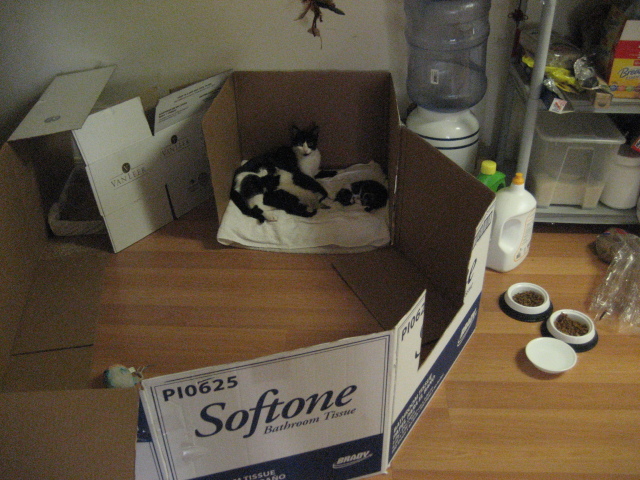 mother cat needs?
Questionplay area
QUESTION: hi Jessica, my mothe
mother cat needs?
Questionplay area
QUESTION: hi Jessica, my mothe
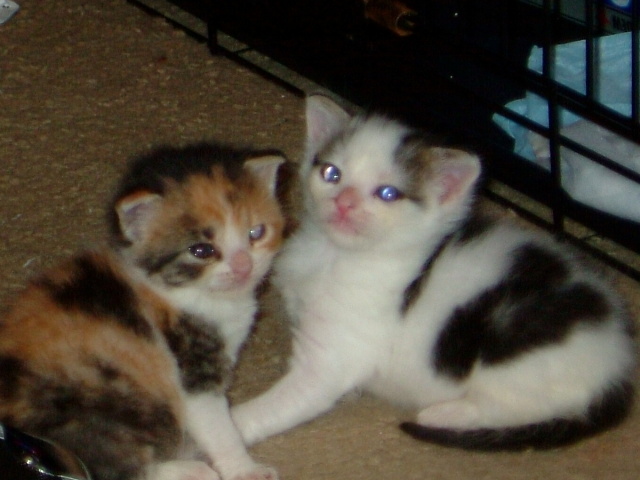 2 Ferals
Question
Sister and Brother at
Hello!
Im so glad I fo
2 Ferals
Question
Sister and Brother at
Hello!
Im so glad I fo
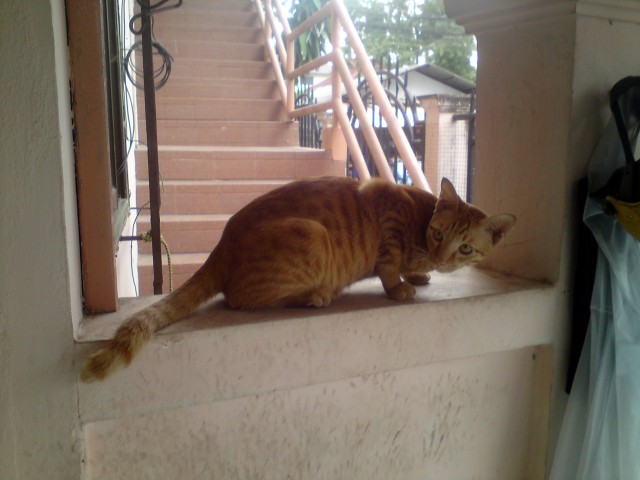 Ocicat
Question
Sesame
My daughter is currently living in Thai
Ocicat
Question
Sesame
My daughter is currently living in Thai
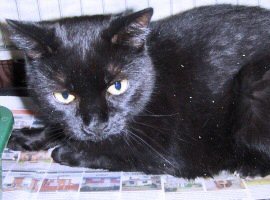 Worried that my cat has a UTI??
Question
Oscar
Hello,
My name is Danielle and I have t
Worried that my cat has a UTI??
Question
Oscar
Hello,
My name is Danielle and I have t
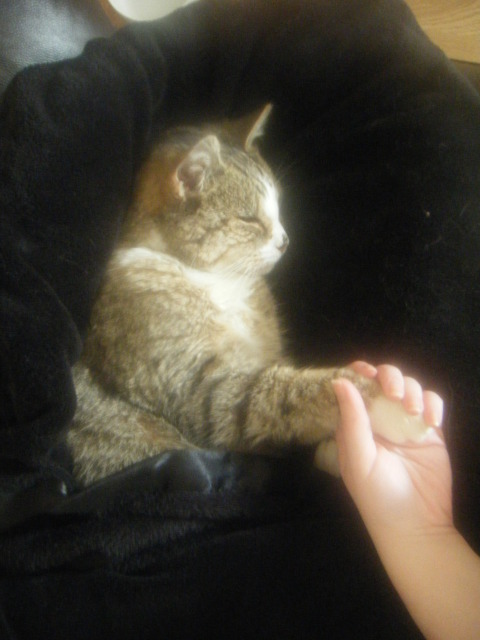 my old cat with no appetite
Question
Timmy since his loss o
Hi, Im really worried a
my old cat with no appetite
Question
Timmy since his loss o
Hi, Im really worried a